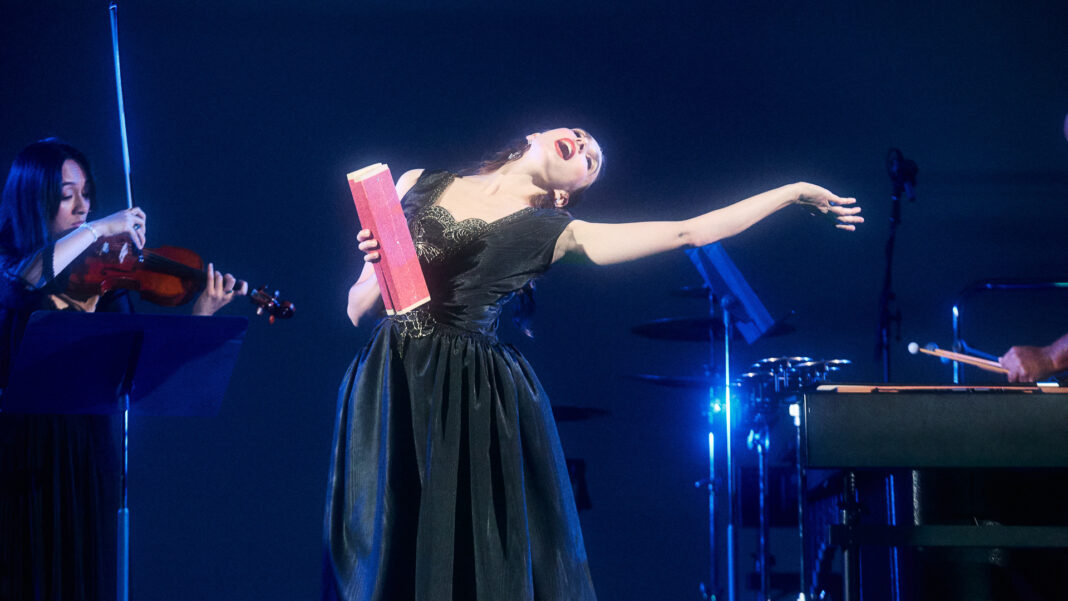For anyone who saw Ellen Reid‘s Pulitzer Prize-winning opera p r i s m when it had its world premiere in Los Angeles at REDCAT in November 2018, it is impossible to forget the powerful singing and acting by Anna Schubert who sang the role of Bibi. Those who did know that she dives head first into very complicated material. Complicated both thematically and musically.
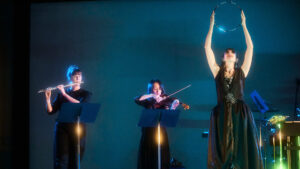
Schubert now steps up for another challenge: the sole singing role in Kate Soper‘s Ipsa Dixit. Long Beach Opera is performing Ipsa Dixit at the Art Theater in Long Beach on June 8th and 9th. It’s a very difficult work that Soper wrote for herself to sing accompanied by three musicians on flute, percussion and violin.
For this production, director James Darrah is adding two dancers (Anna Souder and Leslie Andre Williams) from the Martha Graham Dance company performing choreography created by Janet Eilber.
There are also film elements from Carl Theodore Dreyer’s silent film classic The Passion of Joan of Arc. Christopher Rountree conducts.
Recently I spoke with Schubert about her passion for contemporary opera, taking over a role originally performed by composer Soper and finding the inspiration to tackle such complex roles. What follows are excerpts from our conversation that have been edited for length and clarity. To see the full interview, please go to our YouTube channel.
Q: You are a passionate advocate for new works and for contemporary classical music. What do you think are the greatest misconceptions about what new music is today?
I think one of the greatest misconceptions is that the audience won’t understand it or won’t respond to it, or especially that new audiences will not want to see it. Every time I do any new work I have people come up to me afterward that say, this was my first opera, or, this was my first time coming to see something like this. I didn’t know opera could be like this. I didn’t know that this kind of music existed. And they’re always really excited, just entranced by what they saw.
You have worked with Kate Soper before on The Romance of the Rose. What do you most respond to in her work?
I think an advantage that Kate has as a composer is that she knows what she wants and she’s very exact about what she writes and how she wants it in the score. Oftentimes she’ll write staging out. In The Romance of the Rose there was staging written in already. With Ipsa Dixit there’s like 30 pages or so of performance notes before the score, that have text and translations and notes about what certain figures might mean – in terms of the sound that you’re supposed to produce. Everything is written in there for you.
But there is freedom for you as an artist to bring what you do to it as well, right? It’s not regimented.
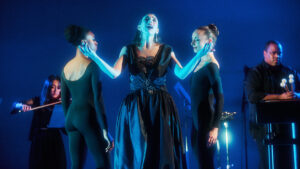
There’s plenty of room for artistic interpretation as well. But she is very meticulous in the details of her work. More so, I think, than other composers that I’ve worked with. But yeah, there is still plenty of room for like, how do I want my face to look or what kind of a forte do I want to make this. It doesn’t have to be the exact same as everyone else’s or hers. She was the first one to perform this and the person who most performs it well.
That gives her an advantage as a composer because she is writing for her voice, which means she must know very well how to write for voice.
I think she knows very well how to write for a lot of instruments. She does write really well for voice, but I think also she has like a unique instrument that she writes for specifically. As a soprano, I rarely have to go below a middle C, and she goes below middle C a lot because I think she has a very unique range where she can just belt out in her chest voice. I think the lowest note I have to go down to in this piece is a D flat below which I had never sung out loud before. Then the highest note is a high D, so it’s a very rangy piece.
You’re kind of trying to fit into the the box that she created for you. If maybe you’re used to kind of existing over here, well, for this piece you need to exist here. So you better figure it out.
If you were to describe Ipsa Dixit to people who have no idea what it is, how would you describe it?
I don’t know, because it’s not an opera. And it’s not a song cycle. And it’s not really a chamber piece, but it is also all of those things. It is hard to define it. It is just like a doctoral thesis, encapsulated in a piece of music. It’s very, very, complex and intricate and there’s a lot of philosophical text; there’s philosophical questions posed and answered. There’s also drama. There’s also poetry. There’s the drama of opera, but there’s also the poetic nuance of art song and then there’s also a bunch of extended technique and the wild things that we’re doing.
Given how many different sources are used for the text, is there any part of the text that you most that most resonates with you that you are most passionate about?
I think the metaphysics movement – which is movement five of the whole piece. It’s this whole existential question where she’s talking about what is matter? What is existence, really? It’s the only part of the piece where I get a break as the singer, where the instrumentalists just take over for a few pages. It’s kind of eerie, but it’s also calming in a way.
This is not your first collaboration with Long Beach Opera. Nor is it your first collaboration with James Darrah, who, I thin, in the best possible way, is a disruptor. But only in the sense of moving the art form forward. How does this production accomplish that goal?
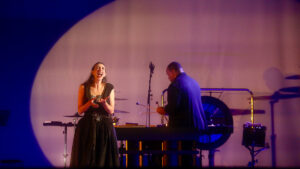
This is an opera company and this is a very nontraditional performance for an opera company to offer. I think something that James is very passionate about, and something that I appreciate as a performer myself and someone that loves to do new works, is that he programs so much new music on the main stage. It’s part of the main season. It’s not a side project.
Opera, whether new or old, I think is at its best when it’s dealing with really big emotions and complex issues. But what are the personal challenges of delving so deeply into this kind of material?
For me, that’s always been about having some kind of balance. I know with p r i s m, it just weighed so heavily on me while we were rehearsing it. I mean, how could it not? When I’m here, in my home, your time is your own. In the weeks leading up to this, I was just rehearsing by myself at home as much as I could. Now that we’re in rehearsals, I’m trying to keep my home a much more sterile place. I’m done rehearsing for the day, I’m going to go home and do dishes and make food for myself and see my family and take my dog on a walk. I think that helps compartmentalize.
When I spoke to Kate, she told me that she hopes that one of the reasons her stuff is you’re sticking around is because it’s just really challenging and interesting and a fun experience for the performers. Is this work fun to do?
I’m going to be honest, this is one of the hardest things I’ve ever put together. I was actually going to send her an email today saying as much. Memorization wise, it’s definitely the hardest thing I’ve ever had to memorize. All new music is more challenging than we’re used to when you’re only studying super tonal, melodic, beautiful, romantic things in school – which is often the case. I don’t think that this kind of music is studied enough or prioritized enough in conservatories, at least in the US.
This music is very, very challenging, and I’m sure she wrote it to be that way. But therein lies the satisfaction of putting it together. I think she’s right about that, because it is challenging. That’s one of the reasons that it’s had a long life because everyone wants to climb that mountain, right? When you see something difficult, you’re just like, well, I want to show people I can do that.
There’s a manipulated film component to this production and that’s Carl Theodore Dreyer’s, silent film The Passion of Joan of Arc. Dreyer is quoted as having said, “There is no greater experience in a studio than to witness the expression of a sensitive face under the mysterious power of inspiration. To see it animated from inside and turning into poetry.” How does the mysterious power of inspiration work in your life, both professionally and personally?
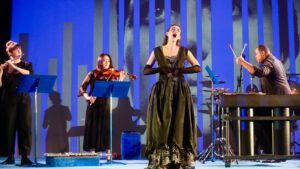
It’s still mysterious to me in a lot of ways. Inspiration strikes me at all those inconvenient times [like] when I’m trying to fall asleep at night. When I’m working on a piece and I’m just really in the thick of it, I find myself going to sleep at night and thinking about the words.
I tend to find the most inspiration when I am outside, away from overstimulation. Definitely on a hike. Or I like to be outside at night. I can’t count the number of times I’ve just gone on night walks by myself and listened to music that I love.
You have a whole universe swirling around because you’ve been able to just block out all the extraneous noise. The stillness in there. So that I think that is when I find my mysterious inspiration strikes.
To see the full interview with Anna Schubert, please go here.
Main Photo: Mona Tian and Anna Schubert in Ipsa Dixit (Photo by Jason Al-Taan/Courtesy Long Beach Opera)











